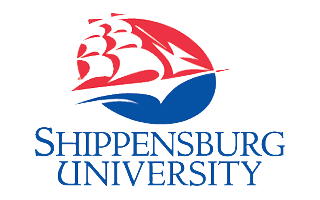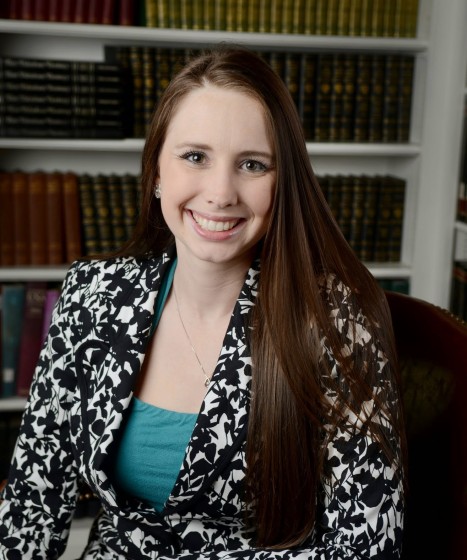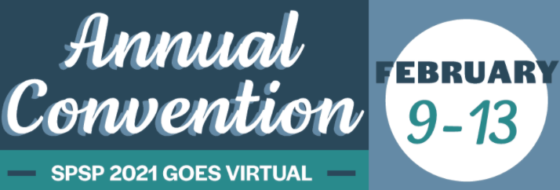
On February 9-13, eight students attended the Society for Personality and Social Psychology (SPSP) Conference virtually, to present research through poster sessions and to attend presentations. The students included Sophie Bacon ’20, Carolynn Bructo ’21, Ben Campbell ’22, Sydney Caulder ’21, Kira Hunt ’21, Abbie Joseph ’21, Naomi Painter ’22, and Carly Schepacarter ’21.
This blog post will highlight the posters that the students presented and a brief summary of their research.
Sophie Bacon ’20
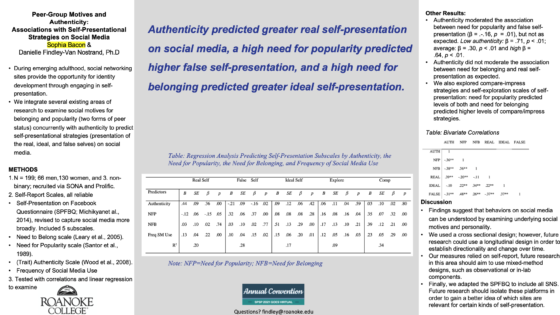 Research has shown that social networking platforms (Instagam, Facebook, Snap Chat, ect) afford the opportunity for identity development, specifically through engaging in different types of self-presentation. In this study, we examined the association between social goals (including, authenticity, the need for popularity, and need for belonging) and presentation of the real, ideal, and false self on social media.
Research has shown that social networking platforms (Instagam, Facebook, Snap Chat, ect) afford the opportunity for identity development, specifically through engaging in different types of self-presentation. In this study, we examined the association between social goals (including, authenticity, the need for popularity, and need for belonging) and presentation of the real, ideal, and false self on social media.
Our main findings were that Authenticity predicted greater real self-presentation on social media, a high need for popularity predicted higher false self-presentation, and a high need for belonging predicted greater ideal self-presentation.
Carolynn Bructo ’21
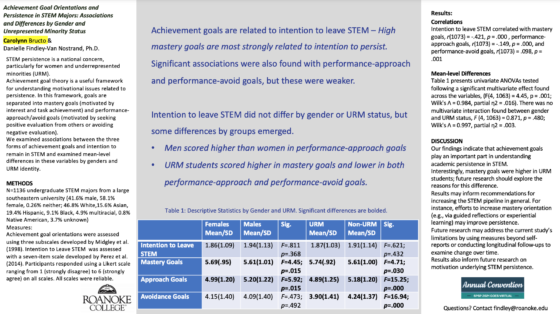 In this study, we examined achievement goal orientations (mastery, performance-approach, and performance-avoidance) in association with intention to remain in STEM majors and differences in these variables and associations by gender and unrepresented minority status in a large sample of undergraduate students. Results suggest achievement goals are meaningfully related to STEM persistence.
In this study, we examined achievement goal orientations (mastery, performance-approach, and performance-avoidance) in association with intention to remain in STEM majors and differences in these variables and associations by gender and unrepresented minority status in a large sample of undergraduate students. Results suggest achievement goals are meaningfully related to STEM persistence.
Ben Campbell ’22
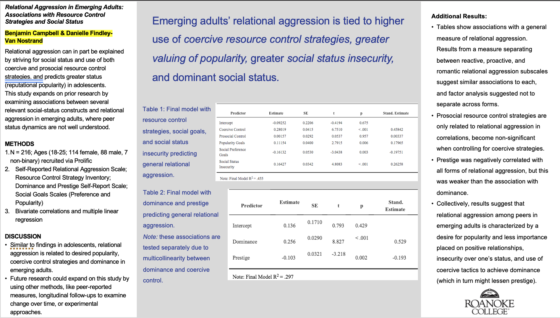
This study aimed to expand on past research on relational aggression in adolescents, but in emerging adults (age 18-25). Relational aggression is an indirect form of aggression used to harm relationships (e.g., silent treatment, excluding others from a peer group, gossiping, verbal threats). We examined associations between relational aggression, resource control strategies (coercive and prosocial), social status (popularity, likeability, and social status insecurity), dominance, and prestige. Results showed that like in adolescents, relational aggression in emerging adults is associated with higher use of dominant behavior, coercive resource control strategies, greater social status insecurity, and greater valuing of popularity. This suggests that people who desire popularity and dominance within a peer group use higher amounts of relational aggression to attain and maintain that status.
Sydney Caulder ’21
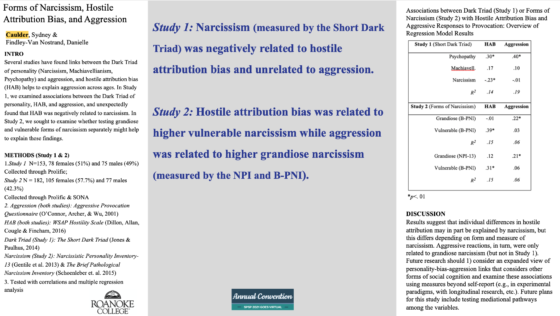 Research has found that narcissism predicts heightened provoked aggression and hostility. However, less understood is the role of hostile attribution bias (HAB) in these associations. In this study, we examined multiple conceptualizations of narcissism (grandiose and pathological) in relation to HAB and aggressive responses to provocation.
Research has found that narcissism predicts heightened provoked aggression and hostility. However, less understood is the role of hostile attribution bias (HAB) in these associations. In this study, we examined multiple conceptualizations of narcissism (grandiose and pathological) in relation to HAB and aggressive responses to provocation.
Kira Hunt ’21
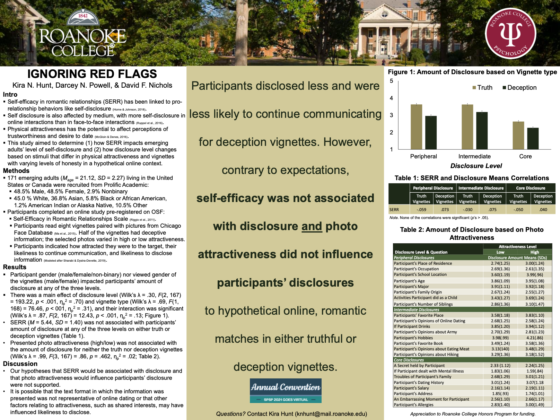
My poster “Ignoring Red Flags” pertained to online dating and how self-efficacy in romantic relationships impacted how much-emerging adults self-disclosed (i.e. shared information about themselves) to hypothetical online romantic matches. I also wanted to determine if disclosure levels would change if these hypothetical online romantic matches differed in physical attractiveness and were paired with vignettes that varied in honesty. We found that self-efficacy was not associated with disclosure and photo attractiveness did not influence participants’ disclosures but the level of honesty did influence disclosure. Participants were less likely to disclose and continue communicating for deception vignettes.
Abbie Joseph ’21
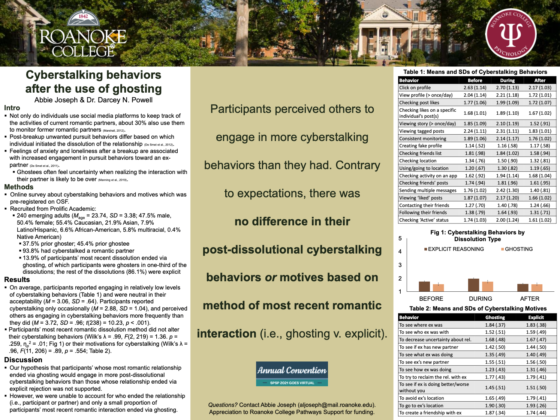
This project explores the use of ghosting as a romantic relationship dissolution strategy and its association with post-dissolutional cyberstalking behaviors. Due to the uncertainty that ghosting involves, it was expected that ghosting would be associated with more severe and more frequent cyberstalking behaviors than relationships ended by other strategies (e.g., an explicit breakup).
Naomi Painter ’22
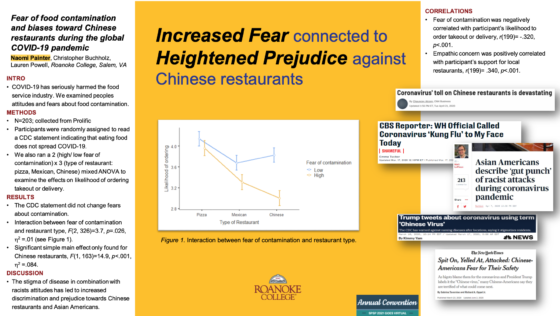
COVID-19 has impacted the food industry’s means of operation and employment. We examined the effect of stigmatization against Asian restaurants on the perception of contamination and willingness to order takeout. We found statistically significant effects as participants with a higher fear of contamination were less likely to order takeout and were also less likely to order Chinese food.
Carly Schepacarter ’21
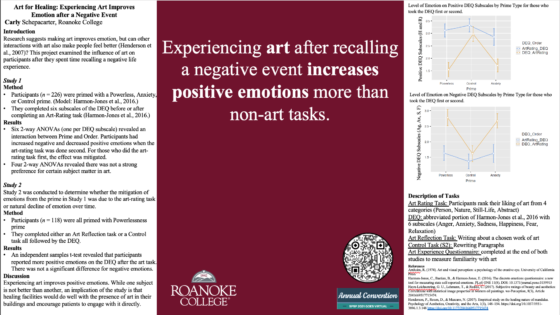
This project’s goal was to determine if people experiencing a negative life event have different tastes in art than others, as well as if interacting with art can help those people have an improved emotional state. In the first study, we were interested in studying if individuals reported a different preference for art after recalling a negative event, and we wanted to know how exposure to art would impact their emotions. Ultimately, participants did not have a specific preference for a subject matter in art, but there was an interaction between Prime and Order which means that the Prime did impact the emotional state of the participants when they did the emotion questionnaire right after the prime, but this effect disappeared when they did the art rating first. The second study tested if this happened because of some impact of the art task, or because of natural decline over time. The results indicated that participants who completed an art task had more positive emotions on a questionnaire than those in a non-art control task. From this, we can say confidently that experiencing art after recalling a negative event increases positive emotions more than the control task. Research from this project was used to create paintings for Hopetree Family Services in Salem, VA.

.
.
.
Get Connected!


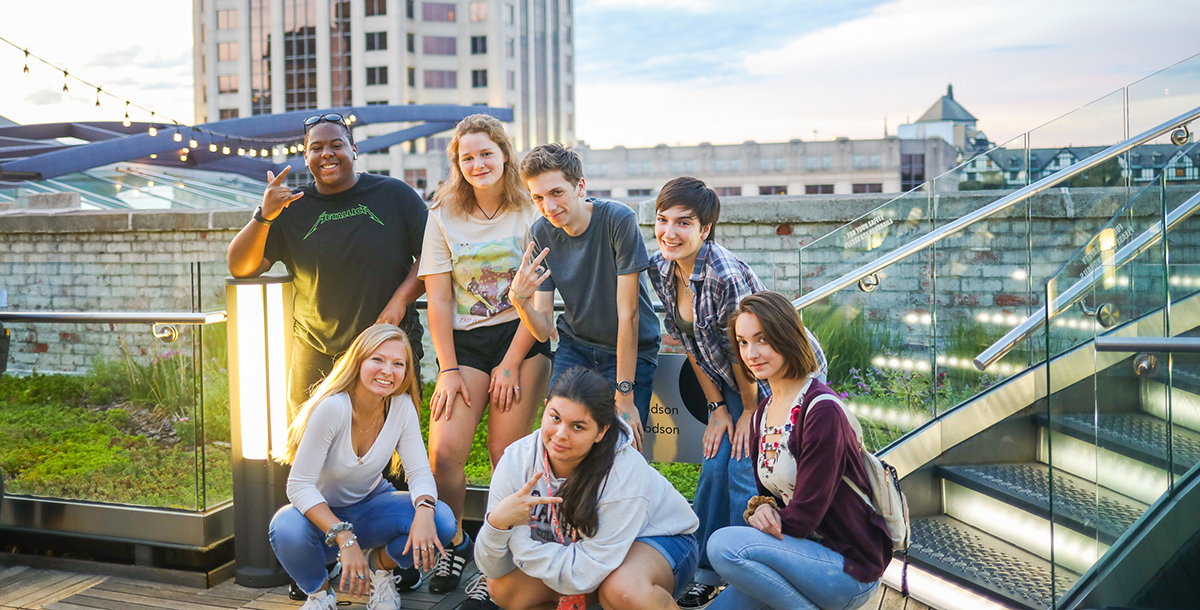
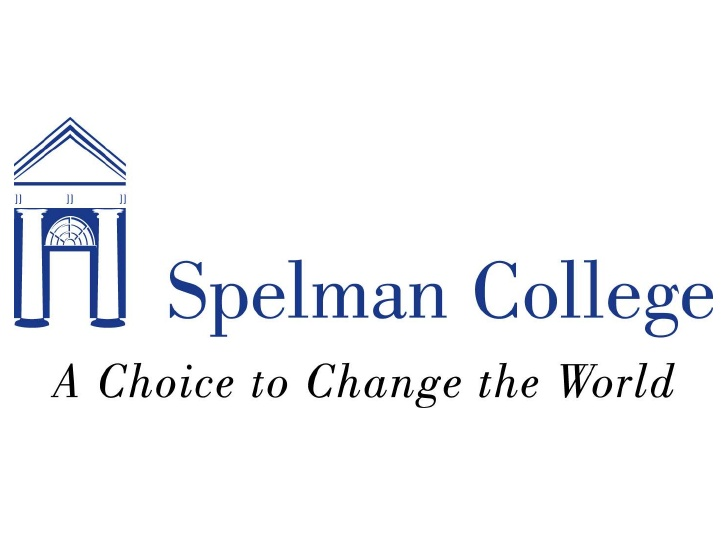 Dr. Dickens’ social psychology research lab at Spelman College is looking to hire an undergraduate research assistant to help with research focused on the experiences of Black women in STEM education.
Dr. Dickens’ social psychology research lab at Spelman College is looking to hire an undergraduate research assistant to help with research focused on the experiences of Black women in STEM education.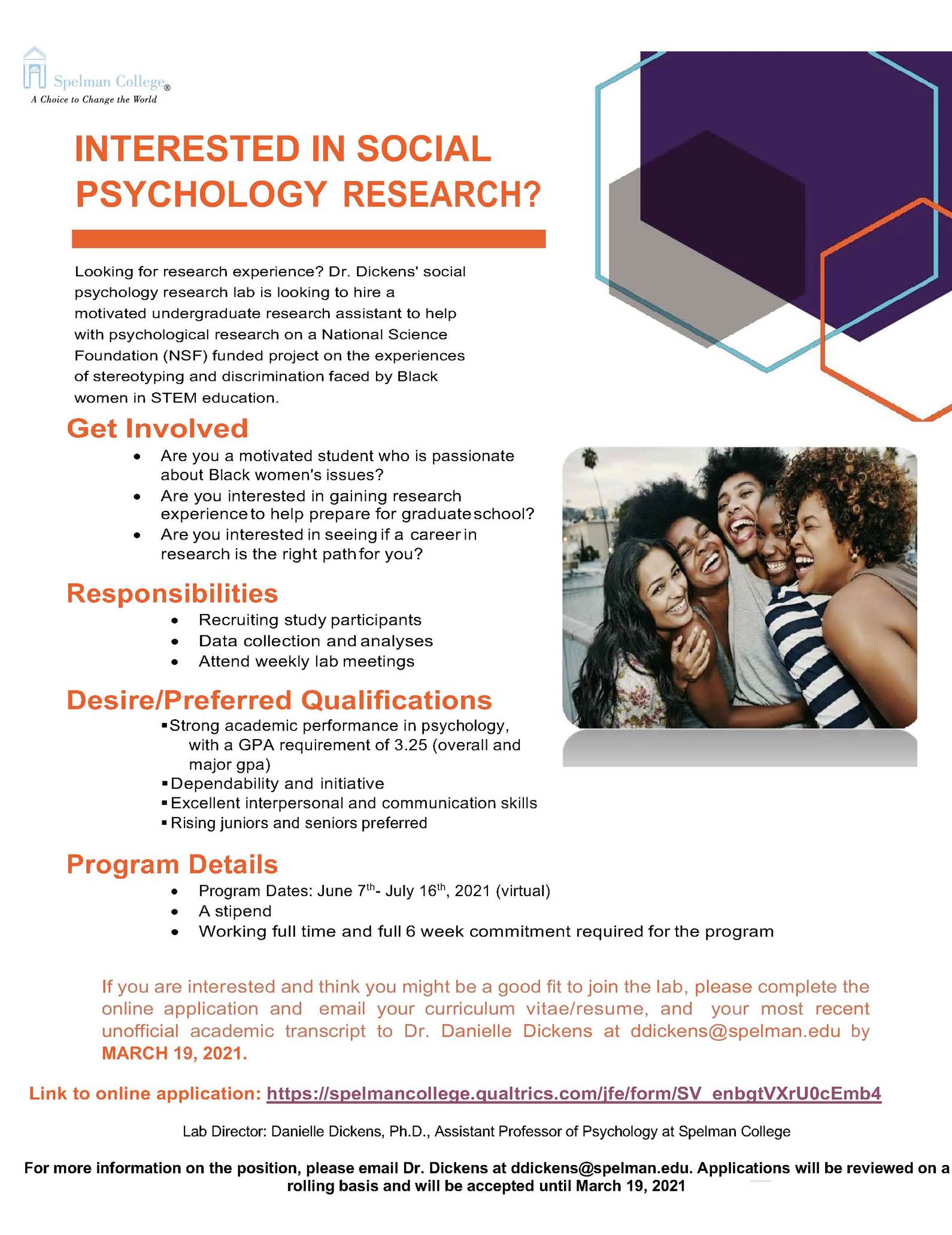
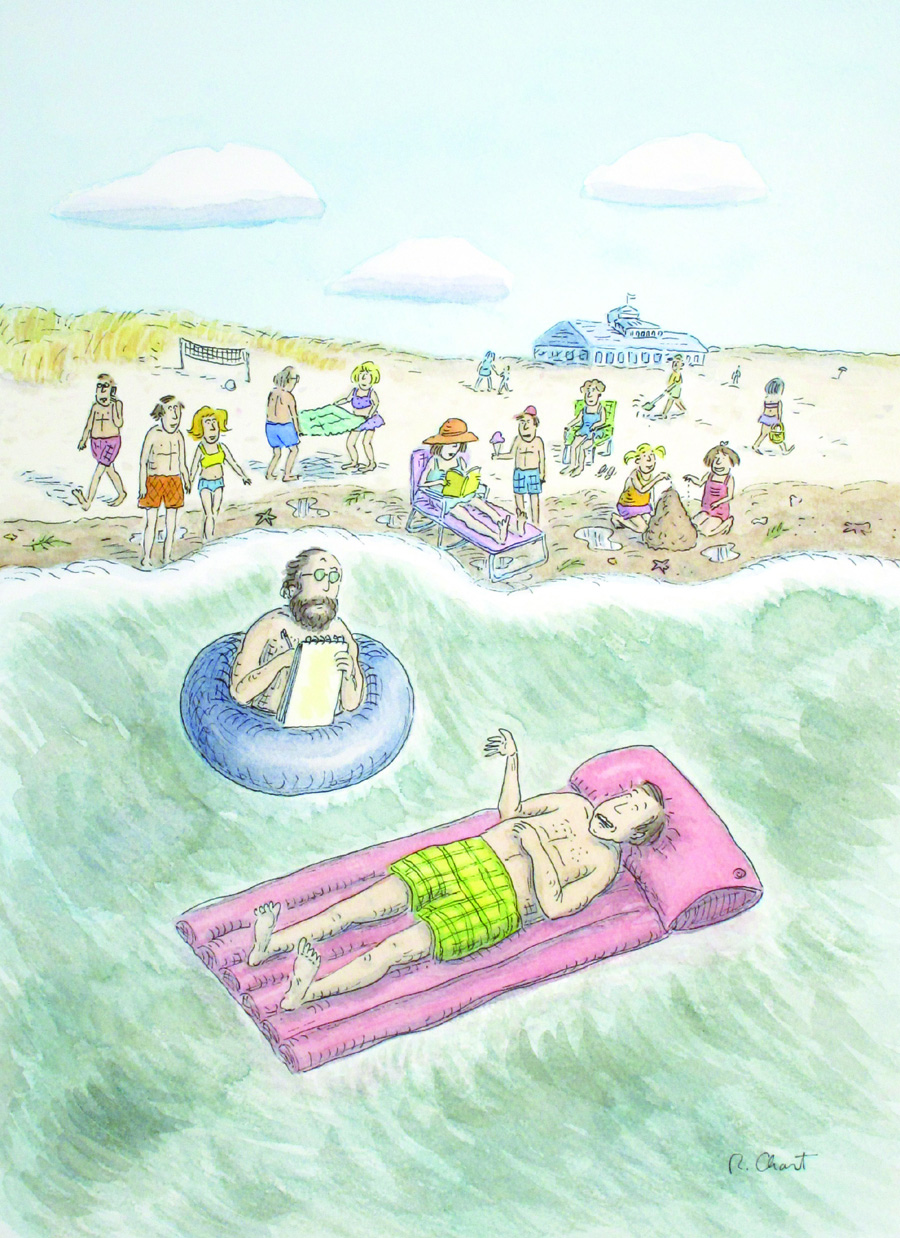


 Research has shown that social networking platforms (Instagam, Facebook, Snap Chat, ect) afford the opportunity for identity development, specifically through engaging in different types of self-presentation. In this study, we examined the association between social goals (including, authenticity, the need for popularity, and need for belonging) and presentation of the real, ideal, and false self on social media.
Research has shown that social networking platforms (Instagam, Facebook, Snap Chat, ect) afford the opportunity for identity development, specifically through engaging in different types of self-presentation. In this study, we examined the association between social goals (including, authenticity, the need for popularity, and need for belonging) and presentation of the real, ideal, and false self on social media. In this study, we examined achievement goal orientations (mastery, performance-approach, and performance-avoidance) in association with intention to remain in STEM majors and differences in these variables and associations by gender and unrepresented minority status in a large sample of undergraduate students. Results suggest achievement goals are meaningfully related to STEM persistence.
In this study, we examined achievement goal orientations (mastery, performance-approach, and performance-avoidance) in association with intention to remain in STEM majors and differences in these variables and associations by gender and unrepresented minority status in a large sample of undergraduate students. Results suggest achievement goals are meaningfully related to STEM persistence.
 Research has found that narcissism predicts heightened provoked aggression and hostility. However, less understood is the role of hostile attribution bias (HAB) in these associations. In this study, we examined multiple conceptualizations of narcissism (grandiose and pathological) in relation to HAB and aggressive responses to provocation.
Research has found that narcissism predicts heightened provoked aggression and hostility. However, less understood is the role of hostile attribution bias (HAB) in these associations. In this study, we examined multiple conceptualizations of narcissism (grandiose and pathological) in relation to HAB and aggressive responses to provocation.



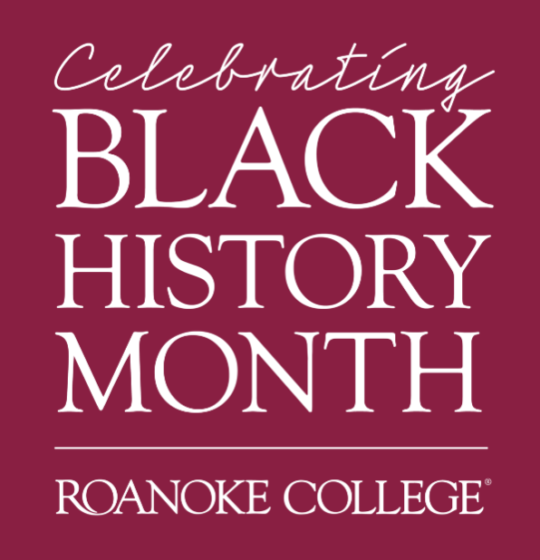 We dedicate every February to Black History Month. A month that celebrates the incredible achievements of African Americans and highlights and recognizes their central role in U.S. history. Roanoke College is celebrating Black History Month through a series of events, of which more information is provided below.
We dedicate every February to Black History Month. A month that celebrates the incredible achievements of African Americans and highlights and recognizes their central role in U.S. history. Roanoke College is celebrating Black History Month through a series of events, of which more information is provided below.